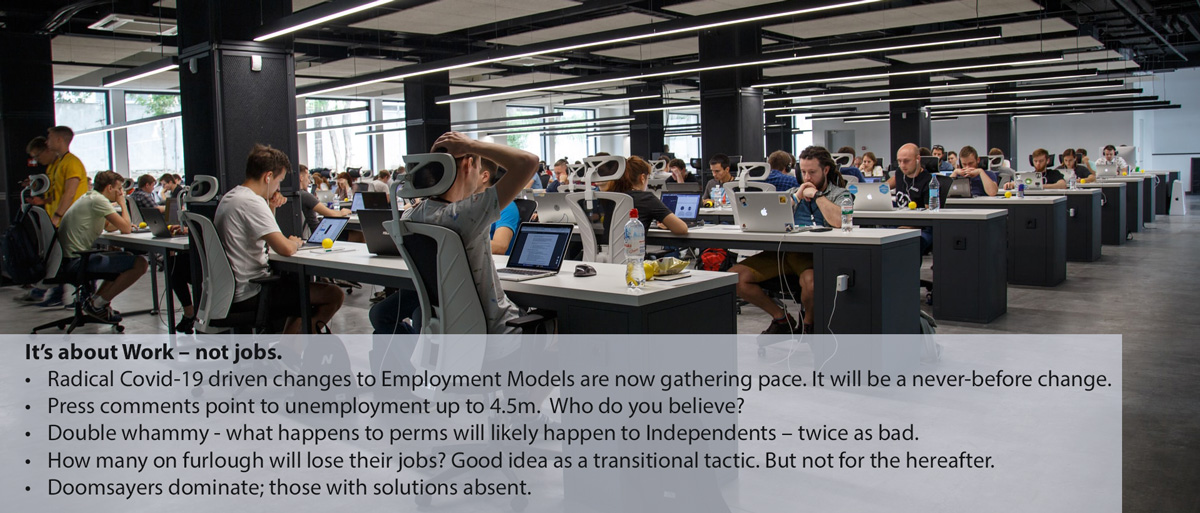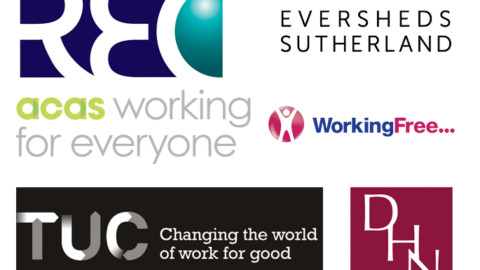It’s about Work – not jobs.
An Opinion Piece from Charles Russam, Managing Director, Devonshire House Network Ltd and Working Free Ltd. 15.6.20

The solution is about work – not jobs. What is needed now are practical, innovative, creative solutions – based on an enlightened understanding of where we are and the line of travel. With an unquantified surge in people looking for work and an unquantified increase in businesses looking for help and, probably, not being able to pay for it, is this a perfect opportunity for government to be as inventive and as interventionist as they have been to date?
www.WorkingFree.co.uk is a specialist career advisory business supporting senior Director-level executives coming off the permanent payroll into an independent working lifestyle. We coach them from dependency into independency – for their own future; for the enlightened reputation of their sponsoring organisations and – increasingly – for the benefit of the community.
www.DevonshireHouseNetwork.co.uk is a people-focused membership club for Director-level professionals in leadership roles who have an instinctive focus on the human side of enterprise. Our purpose is to create, for our members, thinking time and space for key business issues and where people make the difference.
June 2020 may well be seen as a crossroads within employment models and working practices – a time when thinking, attitudes and practices all changed. We are going through a period that starts with massive rethinking of employment models, assesses what it means and points to a way forward.
The irony is that that this process is more one of describing the situation in which we find ourselves rather that working out a line of travel.
What has been and is described as “Employment” will now “transition” into what can best be described as “Engagement”. It’s about Work – not jobs.
The current position can best be seen in the ONS statistics for March 2020; the latest reported month and one that we might describe as “normal”. April figures due on 19.6.20 – and which start to show major changes in employment statistics.
- This is what we have called “Employment”. See below.
- Next comes the transition period – and we can see now how this is taking off but probably not how it might develop and move forward. See below.
- After this will come what might best be referred to as “Engagement”. See below. It is when we all stop talking about Jobs and we talk about Work.
The current magnitude of change should not really come as a surprise to anyone, nor a disappointment. Maybe, it took immensity of Covid.19 to make the change inevitable.
Employment – the current position
The starting point is to understand the statistics. Even now the latest ONS employment statistics – the latest ones are as at the end of March – show no impact of Covid-!9 on employment. This will start on 19.6.20 when the April figures will be published by the ONS. But economics and business data now being published presage the expected distinctly negative news in store for us.
The ONS Monthly Employment Statistics (EMP01 – excellent light reading!) report that at the end of March – before the gathering storm – that the total UK Working Population (not including those unemployed) as 33m and the number of Full Time Employees as 21m – which is 64%. This figure includes 1.2m who have second jobs and also 1.5m temps. This reduces the 64% to 55%.
But if you ask what is the real position – as at 15.6.20 – you get something quite devastating. Also included in the 33m are Public sector workers, accounting for 5.4m (including 1.7m in the NHS) and there are 8.9m on furlough –
So – if you deduct all these figures from 21m – you get 4m. In theory, 4m FTEs available for private sector commercial work – mostly actually doing it at 15.6.20 – in what has been described as the 5th biggest economy in the world – and against a UK population of 64m.
(In fact, if the 4m saw themselves as Independent Consultants, if the 8.9m furloughed workers could be seen as public sector employees and if the 5.4 m public sector workers became contractors – we would ALL be gigworkers.)
Current Full Time Employed Workers (21 Million)
Hints on interpretation and points to bear in mind:-
Getting value out of these figures requires delving into their sources and definitions – tearing them all apart – and seeing what you come up with. If you come up with a different opinion it is likely to be similar and is bound to point to a massive change and one requiring creative crisis management.
- The approach has been to pick out the real FTE figure – 55% – and assume that everyone else is NOT wholly dependent on one employer – and could be described as Self Drive Workers. In practical terms, this creative assessment does not consider the impact – albeit quite small – of part-timers nor the incalculable impact of how all the figures continuously change and interact with each other nor the fact that a number of the ONS figures are self-assessed.
- Self Drive Workers are the converse of “purely full time employees on a payroll. “ Self Drive Workers are those who need, either wholly or in part, to find their own work, their own “clients” – their own things to do – with their infinitely variable and often uncertain levels of reward. They are a varied and mixed group of part-timers, self-employed, contractors, freelancers, Interim Managers, Temps, Consultants, Management Consultants, Semi-retired people, Portfolio Workers, Off-payroll workers, etc. (Portfolio Workers include a broad mix of Professionals who have more than one source of income and work-type activity (payrolled, freelance and non-remunerated). Redundant Executives very often position themselves – often unknowingly – somewhere in this category. Some see themselves as Consultants and some see themselves as unemployed.
- Additionally, and importantly, there are many individuals operating on an independent basis, setting up and/or running micro businesses or entrepreneurs chasing their ideas and not currently earning much, if anything. Over the years, new patterns have emerged including more people with second jobs, zero hours workers, greater numbers of contractors and interim managers, independents teaming up with others and individuals trading through a myriad of business formats.
- Lawyers refer to typical/ atypical workers. The RSA refers to secure/insecure workers. Others have their own
- The ONS figures cover all levels of people in the workforce. This Opinion Piece tends to focus on the more senior levels and assumes that the principles are broadly similar.
So …. All of this describes where we are right now – 15.6.20. Actually, the reality is different because we know it is different – but until the ONS publish their figures on 16.6.20, we won’t know how different.
Transition
What has happened now, of course – and is accelerating – is that the human resource now or likely to be displaced will be a very high number. Last month it was 1.3m. Figures out in the next few days are expected to be around 2m. Government circles are quoted as seeing this rising to as much as 4.5m over the next year.
The issues, here, affect every aspect of human endeavour in the UK – Government, Businesses, Unions, Individuals, influencers and commentators.
Scary numbers indeed. What makes this even more difficult to get a good understanding of is all the variables. But it is likely to happen over a period of time. In particular, workers on furlough are at risk of redundancy but this is not likely to materialise significantly until the furlough period – and as extended – draws to a close.
The issues here affect every aspect of people at work in the UK through Government, Businesses, Unions, Individuals, influencers and commentators.
- Government – Government is most comfortable when thinking about workers as all Full Time Employees (FTEs) – easy to control and understand and quite easy to tax. They don’t seem to be able to handle other work models in quite the same way. They got into a muddle when trying to respond to RSA Chief Executive Matthew Taylor’ s excellent Report – “Good Work” A Report on Modern Working Practices.” published in July 2017. Their attempt at implementing his recommendation to introduce a new category of “Dependent Contractor” alongside Employed and Self Employed resulted in another definition of IR35 which few people thought in any way helpful. In fact, it was the reverse. Many observers take the view that just about the only benefit from Covid-19 has been the Government’s decision to defer until next year the implementation of their new IR35 rules for independent contractors in the private sector. However, a new Government faced with worsening workplace conditions will surely be keen to promote any measures that will help redeployment and re-employment of displaced workers.
- HMRC – HMRC has a difficult job to do, charged by law to collect all tax as and when due. They must dislike the work they have to do in assessing and collecting tax from Independent Workers and similar workers operating through limited companies. For HMRC, it must be too much special work and argument and too little tax revenues. They also have to live with the inherited but diminishing belief that Independent workers are tax dodgers. On balance, HMRC do a great job within their remit.
- Businesses – Generally, businesses like Independent workers – valuing their immediacy, focus and flexibility and, more often than not, their ability to deliver. They see them as comparatively cheap, quick and bid-able. They are vital for today’s 24/7 working, flexibility and efficiency. During this last year Brexit and the threat of the new IR35 legislation for the private sector have – unnecessarily – damaged contract worker – both direct and through Providers – business volumes.
- Unions – Trade union membership has halved since 1979 – with density in the private sector just 13.3 percent. Decreasing membership and difficulties in finding new membership targets – particularly with younger members – have been a major concern for them. Unions don’t want and don’t like their members being out of work. They also don’t like their members being replaced by contract workers. The reality is that Unions are very probably more necessary now than ever before as we stand on the threshold of a greater incursion of AI at lower levels and more contract staff being engaged at upper middle and senior levels. Is their traditional mission of preventing abuse working? Clearly, it is needed more now than ever and adapting to new working models is important.
A note about Context – The sweep between typical and atypical working patterns is very broad. It covers zero hours workers struggling to make ends meet all the way up to fat cats doing their own thing after a successful and highly remunerated c-suite role in a little-risk environment. In many ways, what we have now is an outcome of rapid change – such as happens in industrial revolutions. It almost drives itself with little third party interventions. It is also about money, about lifestyle choices. But it is also about ethics and morals.
Consider, for a moment Ken Loach’s latest film – Sorry We Missed You. This film shines a light on zero-hours contracts and their effect on family life. So says the FT’s review. Loach’s latest gritty film paints almost a nihilistic picture of gigworking at the entry-level. Not enough to live on, no legal protection, no social network and big unwanted risks leading to mental health issues. This has to be morally wrong by any standards. But is it true – and/or widespread? Where do responsibilities lie n making gig work pay for the worker and the employer? Who should do what? You can see the YouTube trailer here – www.youtube.com/watch?reload=9&v=ysjwg-MnZao
- Individuals – Doors close – new doors open? Of course, they do! And speeded up by AI. The challenge is to find these opportunities and profit thereby. Very do-able. But, certainly, lots of change. There is growing comment about the increasing importance of individuals – with increasing evidence that some appointments are becoming employee-driven. Employment contracts are becoming more bespoke – and closer to the sort of commercial contractual arrangements used by Independents. The abiding issue is to what extent should Independent workers have access to the same benefits and legislative protections as employed workers. This has been an unwelcome distraction for many years. On one hand, any civilised society should look after the basic needs of their people. On the other hand, Independents want to be independent. They don’t want jobs. They want work. However, the current IR35 situation is unsatisfactory in that contract workers who now have tax and NI deducted at source, as do permanent employees, do not have access to the benefits and legislative protections enjoyed by their counterparts on the permanent headcount.
- Influencers and commentators. They need more information, more ambition, more excitement. Expose abuse – but celebrate successes. Wie will be looking at drivers other than the profit motive to make businesses successful again. Are we looking at Shareholder return really colliding with ESG activism?
Engagement – finding answers to intractable challenges
How should the UK respond to an economy when faced with continuing negative GDP growth, an unacceptable level of business bankruptcies, unemployment getting closer to 4.5m and limited impacts from traditional levers?
- The unemployed figure is based on the ONS monthly survey of 100k adults from 40k households and the percentage is based on the full amount of economically active adults. This is slightly less than the full figure for the working population. At the end of March this was 33m. The figure is different that the claimant count. It is important to note that this 33m includes all these who we refer to in this Paper as Self Drive Workers. Mostly, these are self-employed people. These people would very rarely self- classify themselves as unemployed. – even if they have no earnings. The significance of this is that Self Drive Workers who have no earnings – the equivalent of being unemployed- never feature in the unemployed stats.
- If we get 4.5m unemployed – or near that figure – it is likely that the real effective figure would be considerably more. This is because just over half of all workers are FTE and 100% of all workers is much greater than that. What will also happen is many of the (up to) 4.5 unemployed will stop looking for jobs (as there won’t be any) and start looking for work. They will see themselves as Independent Workers, whether they style themselves in this way or not.
- In addition to this – and in these circumstances – we are likely to find an unquantifiable number of employed people with no earnings/ work or very short of work who do not classify themselves as unemployed – or even Independents. This would include a huge number of people who style themselves as “Management Consultants” or just “Consultants.” This community starts with the global players and moves down the size scale to the niche operators (many being individuals). It might surprise many to discover just how many of the high-earners are going to go short of work – and may already be weakened through Corvid-19. (See separate Opinion Piece.)
- The Conservatives have always had an aversion to nationalisation. But that is what they have done now. Surely, it’s ok to keep on doing it.
- The Conservatives have always had an aversion to “cherry-picking”. Maybe it’s time to have another go – and get it right. They should be able to sell the ones they get right.
- One obvious approach would lie in the fact that many businesses will, in practical terms, be owned by the UK Government, probably having converted loans into equity. A proportion of these businesses would need more money and the right sort of new people into the business to do what is required. The Government should build on this level of involvement. This would represent a much deeper involvement than happened in the last recession but, if handled efficiently, would go some way to offset the massive costs incurred so far.
- Amongst others, the RSA makes the case for Universal Basic Income. It likely would do little for employment but it would do a lot for peace of mind, on the basis that the spent money goes back into the economy. www.thersa.org/discover/publications-and-articles/rsa-blogs/2020/05/ubi-basic-income-covid.
- Based on the material in this Submission, we propose that where professional services are rendered through a limited company in circumstances where the hiring body may need re-assurance as to the tax status of the supplier limited company, that company may rely on a clearance certificate from HMRC. This will have the effect of not requiring the hiring company to make deductions for tax and NI for fees billed nor being liable for any costs that would normally be associated with employees of that company. A key part of the clearance from HMRC will forbid any payments being made by the company as dividends out of profits generated. HMRC should also be empowered to collect due tax on a quarterly basis with annual reconciliations.
- Finally – what the Government ought to do is to set up a massive Business Renewal Commission. The function would be to match supply and demand in the business community. Demand would be for resources – people and money – sometimes together- and the supply would be people and money.
Government should not only recognise Independent Working for what it is but should work towards celebrating it. This should start at senior levels – as this is where maximum torque can be obtained but it also easier. Lower levels need to be handled with more care due primarily to Trade Union sensitivities and zero hours issues.
So… the Government’s task is NOT to find or create JOBS – it is to find or create WORK. A rising tide floats all boats!
O that we now had here
But one ten thousand of those men in England
That do no work to-day!
William Shakespeare- Henry V – Act 4, Scene 3.
(Note – Men in this context should include women!)
(Note – Nothing wrong with Innovation, Creativity, Entrepreneurship – or the Agincourt Spirit.)
Charles Russam, Managing Director – Devonshire House Network Ltd.
O8081 565604 – 07785 297059.



